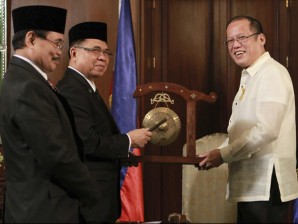After signing of ‘framework agreement,’ more negotiations underway

Philippine President Benigno Aquino III, right, receives a gong from Moro Islamic Liberation Front (MILF) Chairman Al Haj Murad, center, and MILF Peace Panel chief Mohagher Iqbal, left, before the historic signing of the framework agreement between the Philippine government and the MILF at the Malacanang Presidential Palace in Manila, Philippines, on Monday Oct. 15, 2012. AP Photo/Rouelle Umali, Pool
MANILA, Philippines—Before the dust of the celebrations settles, negotiators of both the government and the Moro Islamic Liberation Front are off to work again, this time to try to complete a comprehensive agreement aimed at settling four decades of fighting by the end of the year.
“The reality is, we still have three issues on which to complete negotiations, namely, wealth-sharing, power-sharing, and normalization,” Mohagher Iqbal, the MILF’s chief negotiator, told the Philippine Daily Inquirer.
But he noted that for the MILF, “the framework pact already contains 90 percent” of the peace formula that the parties have committed to firm up.
He said this was the reason why MILF chief Murad Ebrahim has referred to the framework agreement as “the most important document” in the almost 16-year peace negotiations.
The peace panels will convene in Kuala Lumpur next month, together with the two technical working groups, to tackle “the crucial 10 percent” of the comprehensive agreement, according to Iqbal.
A third technical working group, to deal with the “nitty-gritty of normalization,” will also be created to hasten the build-up of a consensus on the issue, he added.
Iqbal said the power-sharing issue was “95 percent finished” while wealth-sharing was only 60 percent done “although what needs to be agreed upon here are largely figures.”
Paragraph 4 of Section IV of the framework agreement provides that the Bangsamoro “shall have a just and equitable share in the revenues generated through the exploration, development or utilization of natural resources” within its territory.
Iqbal said with respect to the normalization issue, the major consensus outputs are the timetable of decommissioning the Bangsamoro Islamic Armed Forces (BIAF), the MILF’s armed wing, and another timetable on the phasing out of government military troops in the region and eventual handing over of full law enforcement responsibility to a Bangsamoro police force.
For the decommissioning stage, Iqbal said, the Northern Ireland experience will be instructive to the parties in the search of models. Under the Good Friday Agreement, all paramilitary forces in Northern Ireland were disbanded and British forces were pulled out.
Iqbal added that the nature and characteristic of the police force that would handle the Bangsamoro’s security would also be defined.
The MILF has refused the integration of BIAF elements into the government’s security forces, unlike the formula adopted by the Moro National Liberation Front under the 1996 Final Peace Agreement.
Since Tuesday, several people in the MILF delegation that attended Monday’s signing of the framework agreement in Malacañang Palace have started going back home.
“When we get back, we will explain to the people the nuances and dynamics of the framework agreement,” Iqbal said.
“We will also reach out to the non-Moros,” he added. “We know the responsibilities upon our shoulders now are not easy. But with enough motivation and support from friends of the peace process, we will be able to adapt to this new and complex level of engagement.”
The MILF has previously admitted the need to step up its internal capacity to oversee the period of transition.
Under the preliminary accord, it will head the 15-member transition commission that will, among other things, draft the Bangsamoro Basic Law, which will serve as the charter of the new autonomous entity when enacted by Congress and ratified in a plebiscite.
From its original proposal of seven years, the transition period has been reduced to three years so that major peace commitments are undertaken under the Aquino administration, he said.
Iqbal said the issuance of an executive order creating the transition commission is due within this year after both houses of Congress shall have also passed resolutions supporting the framework agreement.
Meanwhile, Amnesty International Philippines has called on the Aquino administration to include the concerns of the indigenous peoples in the agreements it would be producing with the MILF within the context of the framework.
“As the government and the MILF formalize the framework of agreement for the Bangsamoro, we at the Amnesty International Philippines urge that the Lumads’ concerns are included, gearing towards the end to abuses and violations against indigenous peoples’ land within the Bangsamoro territory,” Ritz Lee Santos, III, Amnesty International Philippines chair, said in an emailed statement.
Santos said the flooding of extractive business companies, particularly in mining and logging, has led to the scaling up of abuses against the lumad, from land and resources grabbing by interest groups to attacks, harassment and killings.
“The situation is prevalent also in Bangsamoro territories where IPs exist,” he said. With a report from Judy Quiros, Inquirer Mindanao, in Davao City














